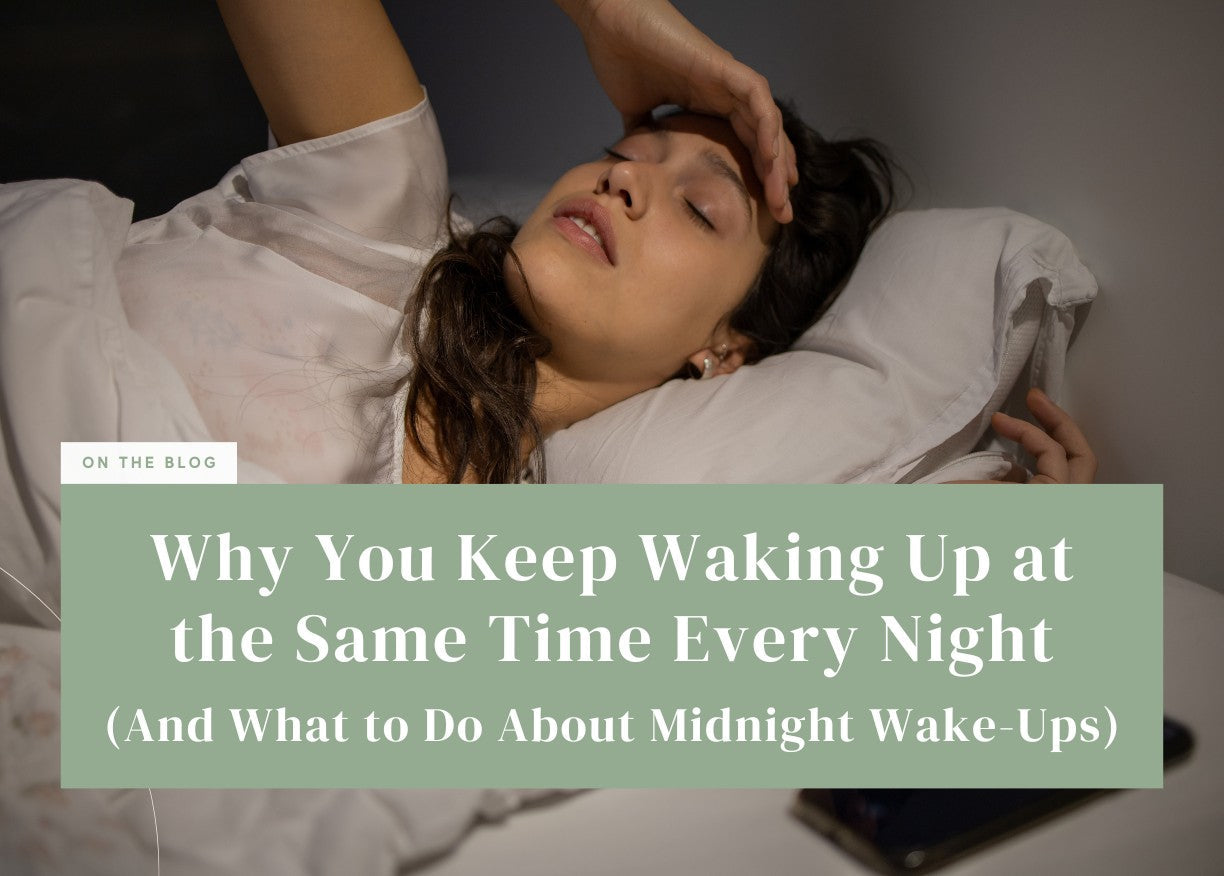Why You Keep Waking Up at the Same Time Every Night (And What to Do About Midnight Wake-Ups)
You check the clock: 3:17 a.m.
Again.
Same as last night. Same as the night before.
You weren’t having a nightmare. You didn’t hear a noise.
You just… woke up. And now you’re lying there, wondering if your brain has a secret alarm you didn’t set.
If this sounds familiar, you’re not alone. Many people wake up at the exact same time every night for what feels like no reason. But there’s almost always a reason—and once you understand what’s happening, you can take steps to fix it.
Why Midnight Wake-Ups Happen
There are a few reasons you might be waking up at the same time every night, even if you fall asleep easily:
1. Your Internal Clock Is Off Balance

Your body runs on a 24-hour rhythm called the circadian rhythm. If this rhythm gets disrupted—by blue light, stress, eating late, or an inconsistent bedtime—it can cause your brain to wake up during specific windows when it thinks you should be alert.
🕒 Between 1 and 3 a.m., the body goes through temperature changes and hormonal shifts that can trigger wake-ups if your rhythm is off.
2. Blood Sugar Dips and Hormone Spikes

If you eat a high-sugar or carb-heavy dinner (or drink alcohol late), your blood sugar may crash in the middle of the night.
When that happens, your body releases cortisol (the stress hormone) to compensate—and that cortisol can wake you up.
✅ Try eating a protein-rich dinner and avoid wine or sweets 3–4 hours before bed.
3. Hidden Anxiety or Mental Load

Even if you don’t feel stressed during the day, your brain may still be processing things at night.
Unfinished tasks, emotions you didn’t address, or even just worrying about sleep itself can lead to nocturnal anxiety spikes.
📝 Try a “brain dump” before bed: write down anything on your mind—without judgment—and leave it on the page.
4. External Triggers You’re Not Noticing

Sometimes it’s as simple as:
-
A heater kicking on at the same time
-
A neighbor’s car door
-
Streetlight flickering through the window
Even if you don’t consciously notice it, your brain does. Try sleeping with white noise or blackout curtains to block potential environmental triggers.
5. Hormonal Shifts (Especially in Women)

Nighttime awakenings are common during perimenopause, menstruation, and early pregnancy, due to shifts in estrogen, progesterone, and body temperature.
🌿 Supporting your sleep environment (and using breathable bedding) can reduce how disruptive those wake-ups feel.
What You Can Do to Stop It
✅ Stick to a Consistent Sleep & Wake Time
Your body craves rhythm. Waking and sleeping at the same time daily—even on weekends—helps reset your internal clock.
✅ Keep Blood Sugar Stable Before Bed
Add protein or healthy fat to your evening meal, and avoid sugar, alcohol, and caffeine late in the day.
✅ Avoid Blue Light & Overstimulation
Try dimming lights 90 minutes before bed and avoiding scrolling in bed. Use amber glasses or screen filters if needed.
✅ Upgrade Your Sleep Setup
If you’re waking up hot, tangled, or uncomfortable, your bedding could be to blame.
🌿 At Sweet Zzz, our Honey Organic Mattress, along with bamboo sheets and plant-based pillows, is designed to keep you cool, supported, and undisturbed all night—so you can sleep deeper and wake up less.
✅ Don’t Panic When You Wake Up
The worst thing to do is stare at the ceiling thinking, “Why can’t I sleep?”
Instead, try this:
-
Do a body scan (mentally relax each body part from head to toe)
-
Try box breathing (inhale 4, hold 4, exhale 4, hold 4)
-
If you’re not sleepy in 15 minutes, read a paper book or journal quietly in dim light
Final Thoughts: Your Body Isn’t Broken—It’s Talking to You
Waking up in the middle of the night doesn’t mean your body is failing. In fact, it’s often trying to protect or regulate you.
The key is to listen—then support your body with better rhythms, less stress, and a more restful sleep environment.
And if you’re waking up drenched in sweat or tangled in stiff bedding, that might be the easiest fix of all.




